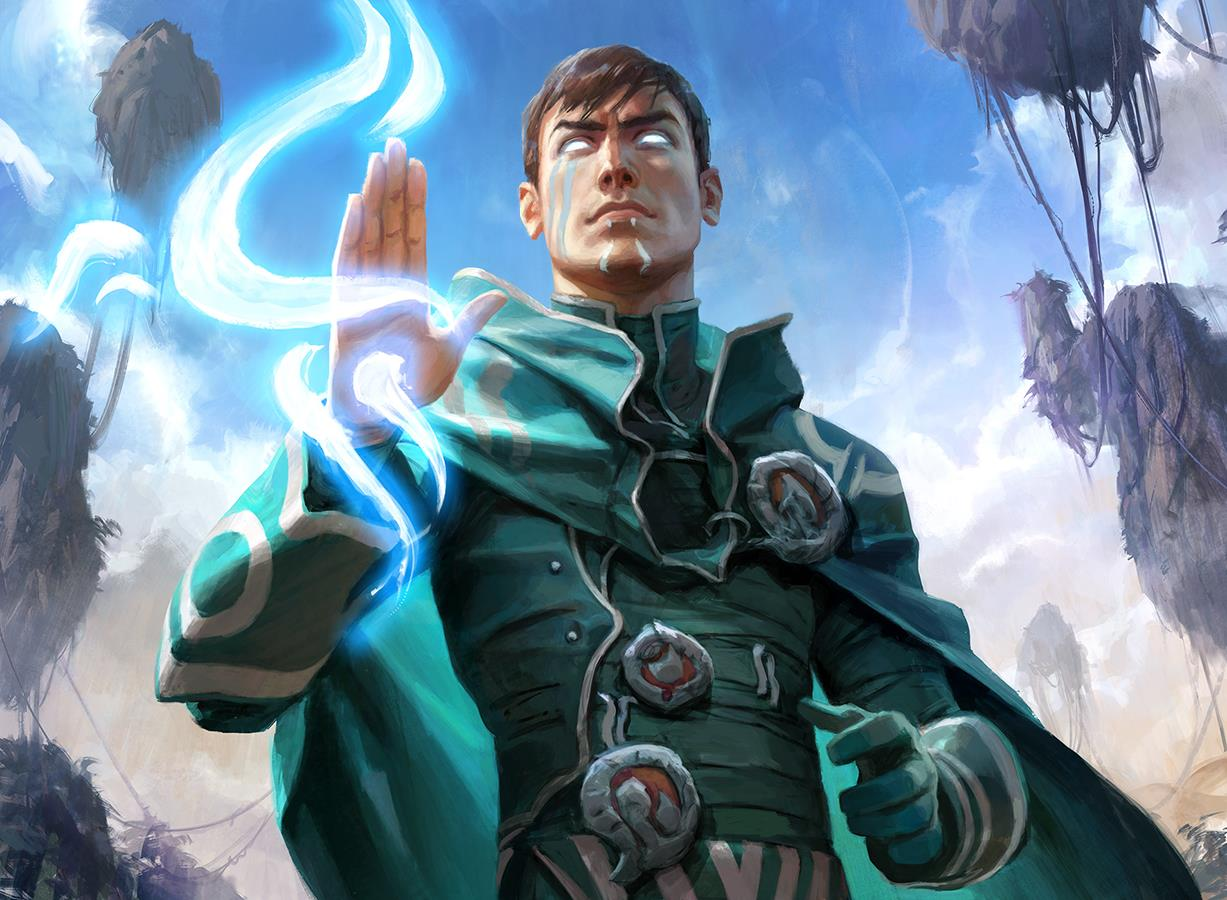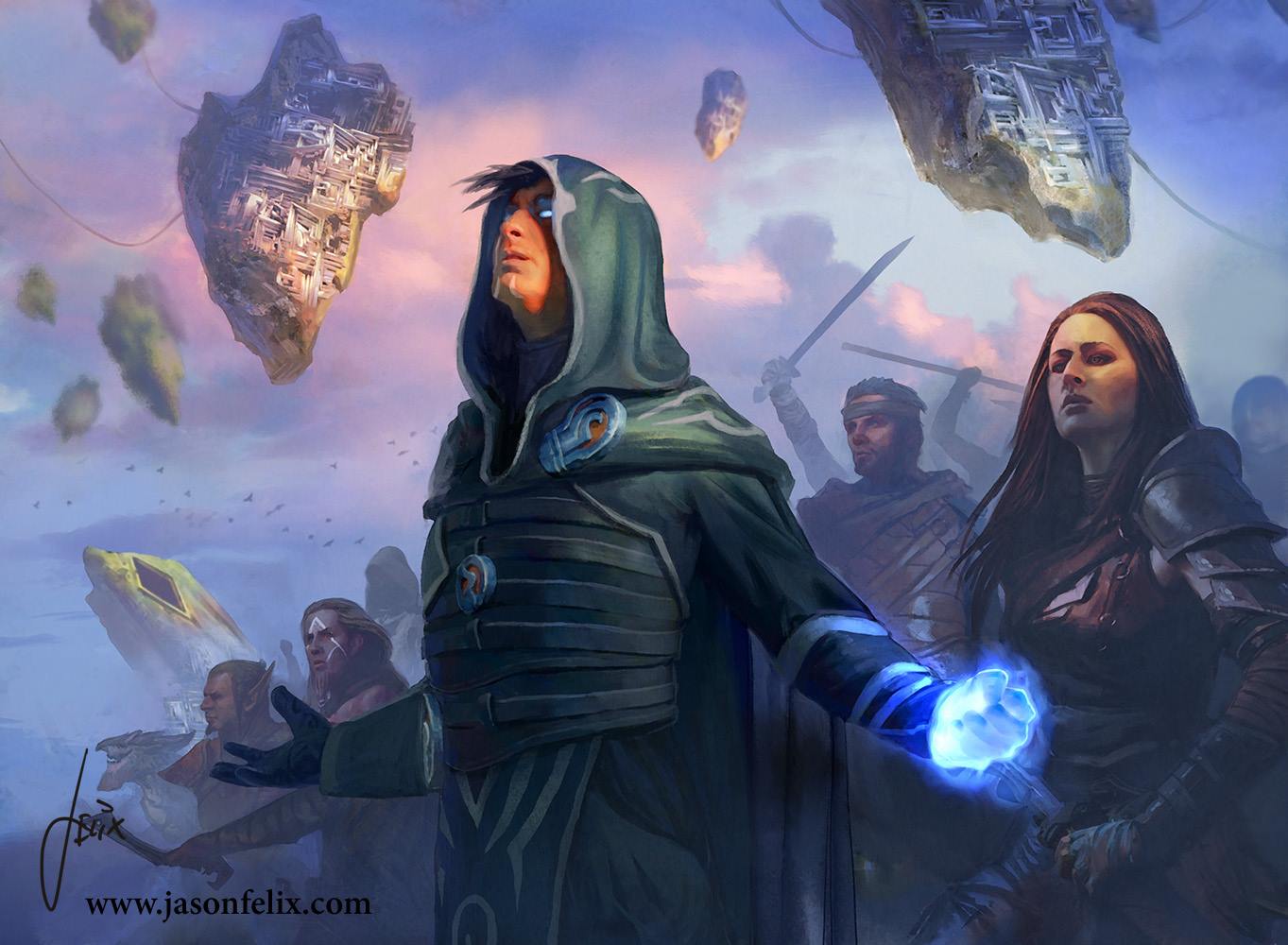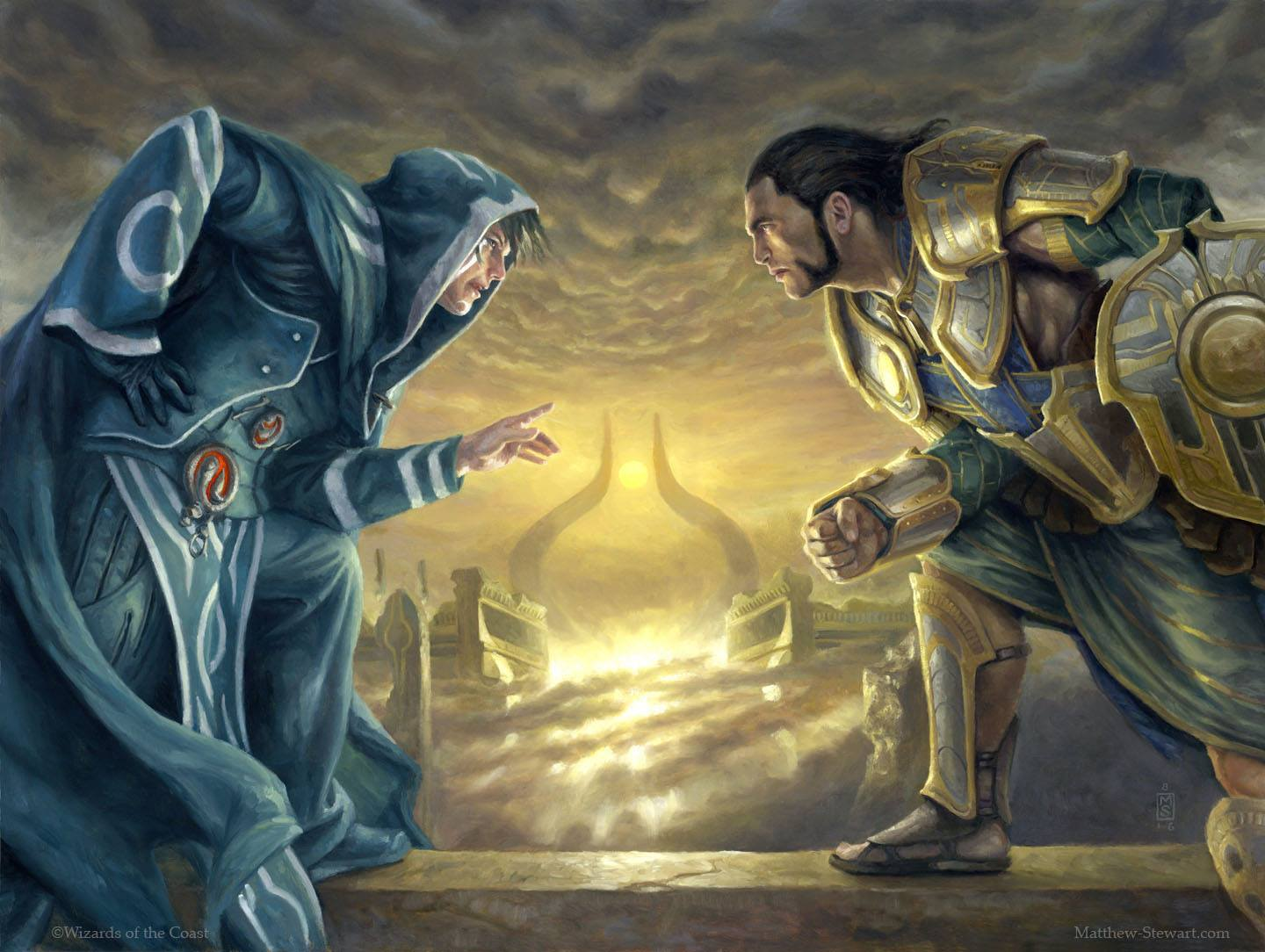This is part two of an article series analyzing the character of Jace Beleren. Be sure to read the first part here.
Jace first meets Gideon Jura when he barges into Jace’s lunch at an upscale restaurant on Ravnica. These are his first impressions:
A tall, broad-shouldered man stood in the street, arguing with Valko. He wore armor, hard-used but well-maintained, and he was covered in blood and dirt and some unidentifiable muck. He pointed toward Jace. He was toward the edge of Jace’s easy telepathic range, but a combination of lip-reading and surface thoughts told Jace what the man was saying: I need to speak to the Guildpact.
Gideon muscles his way past the server and causes quite a scene. He refuses a seat when offered, and Jace refuses to allow Gideon to loom over him:
Jace stood up. It was an error. He still had to crane his neck to look Gideon in the eye, and now the size difference between them was glaringly obvious. He hated feeling small. Hated it.
Moments later Gideon stops him to question his focus:
He took a step, but Gideon stopped him with one hand on Jace’s shoulder. Jace reached up and deliberately pushed Gideon’s hand off of him.
Jace’s first memory of Gideon is feeling physically outclassed and overshadowed by him, dredging up all kinds of insecurities Jace’s conscious mind does not even recall. But that is not his only impression of the man. Look at how Gideon chooses to persuade Jace:
“If you know Zendikar, and you’ve seen the Eldrazi, then you know how serious this is,” said Gideon. “I know you’ll do the right thing.”
Now, when it comes to inspiring people, Gideon is the best there is: it is his greatest strength, far more useful than invulnerability. We’ve seen him manipulate and dance around the egos of blue characters before, but here, he appeals straight for Jace’s sense of responsibility. And it works: Jace may not go out of his way to help others, but he is unwilling to walk away from a mess he created.
More than that, Jace is split between black’s selfishness and pragmatism and white’s heroism and self-sacrifice. In Oath of the Gatewatch, we see this struggle play out in real time. As the Eldrazi are destroying the plane, Jace tries to reign in Gideon’s heroic tendencies, and is the first to suggest abandoning ship:
The elf had sunk to her knees, aghast at the desolation of her world. Gideon took a step toward her, but Jace tugged at his arm.
“Wait,” Jace whispered. “What are you going to say to her?”
“What? I don’t—”
“Don’t make promises you can’t keep,” Jace said firmly.
Whether of their own volition or with the mind mage’s prompting, all the things he might have said to comfort Nissa came to mind: we’ll get them, we’ll make this right, victory is still within reach, this desolate world will live again. Empty platitudes. Jace was right—he couldn’t promise those things.
“I think we have to seriously consider the option of leaving Zendikar to its fate.”
Gideon refuses to accept this, and makes a bold speech to rally the others. He swears to stand guard over the multiverse, for justice and peace. Nissa follows his lead, and rather than running, Jace lets his white side shine through:
“Gideon’s right,” he said. “The four of us have extraordinary power. We have a unique opportunity—a responsibility, even—to use that power against threats like this. The Eldrazi, yes, but there are other threats that go beyond a single plane. I’ve heard it said that a Planeswalker is someone who can always run from danger. But we are also the ones who can choose to stay.”
Jace nodded decisively. “Never again. For the sake of the Multiverse, I will keep watch.”

Planeswalkers are those who can choose to stay. Jace has always been extremely susceptible to peer pressure, and here we see it in action. On his own he would have bailed; but when others choose to risk themselves and face the danger, that white sense of community overpowers his black desire for self-preservation. Purely by his example, Gideon brings out the heroism in Jace that he would much rather deny.
Throughout their time together, Gideon will continue to encourage and threaten Jace. There are a series of moments in Brink of Extinction that are worth paying attention to. While preparing for the final assault, Jace watches Gideon smooth over tensions among the allies:
That brought the smile back to Kiora’s face, at least. Jace could make people do what he wanted, if he absolutely had to, but he barely understood Gideon’s ability to make people want to cooperate. There was nothing magical about it, just charisma and personal integrity—neither of which Jace had ever seen a pressing need to cultivate.
Jace does not understand how Gideon does it, but is unwilling to cede Gideon any superiority. Instead, he sets up a dichotomy where he and Gideon do completely unrelated things, so that any comparison would be totally unreasonable.
“I coordinate,” said Jace. “Where everyone is, when to start Nissa’s spell, and what to do if it starts going wrong.”
“Ah,” said Kiora, with distaste. “Leadership.”
“No,” said Jace. “Leadership is Gideon’s job. This is management.”
But this delusion does not last for long. As their plan is coming together, Jace is at first quite callous with the lives of the Zendikari soldiers.
“You want to use our army as…bait?” said Gideon.
Jace sighed.
“What’s the difference between bait and an ambush party?” he asked.
Gideon waited, frowning, but Tazri spoke up.
“Bait doesn’t get a choice,” she said.
“That’s right,” said Jace. “Gideon, you’ve said these people are willing to lay down their lives for Zendikar. Well, it’s time.”
Gideon accepts his plan, but assigns him two squads of men to serve as a rear-guard. Though he tries to push it off on Nissa, Jace is forced to act like a leader when he speaks to them, if only for a moment.
Jace surveyed the troops—his troops—and the weight of what they were attempting took on harsh reality. He could explain. He could draw them a diagram, illustrate the metaphysics, haul out his metaphors and calculations.
None of that would inspire them to fight and to die. Not the way—
Well, that was one way to approach the problem.
Jace begins to think about Gideon, and then catches himself. To his credit, he leads in his own way: informing the soldiers of the importance of their mission and the likely dangers, then telling them to “plan accordingly.” Very Jace, but it’s not enough.
Eyes widened, jaws set. They understood their task, he was certain of that. But were they actually prepared to perform it?
*What would Gideon say?*
Jace smiled. Of course.
“For Zendikar,” he said, raising one fist in the air. It felt thin to him, lacking Gideon’s armored fist, his baritone war cry, his iron conviction.
None of that mattered. The soldiers shouted as one voice, holding their weapons aloft.
“For Zendikar!”
Not bad at all. This moment would never have happened if Gideon had been present, but behind his back, Jace cannot help but imitate him, and measure the many ways he falls short of the real thing.

Despite his awareness of Gideon’s strength and fitness, it is his charisma that Jace truly covets. He can’t seem to get Gideon’s popularity out of his mind. In Zendikar Resurgent, the final story in the Zendikar arc, Jace sits on a rock and watches as Gideon interacts with people, trying to dissect his secret.
Maybe there was magic in what Gideon did, but Jace didn’t think so. He’d watched the Commander-General move among his troops after the battle—saying a few quick words, putting a firm hand on shoulders, kneeling silently at gravesides and listening to remembrances of the deceased. Everywhere he went, relief and hope took root. Leadership. Jace wondered if it would work on him the way it did on the others.
Jace ought to be able to replicate the effect with telepathy, to work out from people’s thoughts the right thing to say or do to give them solace and comfort. To make people trust him. But Gideon wasn’t a telepath, and everyone knew that. Gideon just knew what to say. Maybe that was why it worked. Maybe Jace should leave charisma to the charismatic and focus on arming Gideon with the best possible information to make those honest, forthright decisions of his. Jace felt a pang of guilt, already making plans to win Gideon over in some imaginary future argument to bring the others around. But then, that’s what Jace was always doing. Making plans.
This is really important: Jace is not behaving mono-blue here at all. Leave charisma to the charismatic? He’s thinking about charisma like it’s an inborn trait that is either present or absent. That’s how green sees the world, not blue! Gideon might “just know” what to say, but knowledge can be gained. If Jace really wanted to learn how to lead, all he would have to do is ask. Think about how out of character it is for Jace to turn down information!
Jace’s old insecurities have him in a stranglehold. Even though just the day before Jace was able to inspire those soldiers, he talks himself out of trying to improve his leadership skills because he cannot imagine himself as a leader. No, he has to be the planner, the orchestrator, someone whose only skill is manipulating better men. So many people have told him this for so long, he has internalized the green belief that who he is is all he can ever be. This is a heart-breaking moment, where Jace stands on the brink of escaping his own self-loathing and then just sinks back into it.
Ugin shows up to chew out the Gatewatch, and specifically calls out Jace:
“You, Jace Beleren,” said Ugin, “have proven to be an extremely arrogant and unreliable partner. If you still insist on helping me, you may best do so by leaving. Immediately.”
Jace was already down on himself, and this rebuke must have crushed him. Thankfully, Gideon is on the scene.
Jace buried his face in his hands.
Gideon gestured, and Chandra, Nissa, and the other Zendikari slowly turned and wandered back to what they’d been doing. Then he sat down on a rock next to where Jace had been standing.
Jace looked down at Gideon, then sat next to him.
“It sounds like our troubles aren’t over,” said Gideon. Sitting down, he was only a little taller than Jace.
When they first met, Gideon barged in on a seated Jace and dared him to stand and be towered over. Here, Gideon sits first, allowing Jace to loom over him for once. Instead, Jace sits as well. Gideon literally lowers himself to Jace’s level, as best he can, and Jace immediately picks up on it and is encouraged. Like a larger-than-life figure stepping off a pedestal, Gideon treats Jace like an equal. They talk over the situation, and agree that Jace should go to Innistrad to learn more about the Eldrazi.
“I trust your judgment,” he said, looking Jace in the eye. “When can you be ready to leave?”
“Today,” said Jace. “I need to gather supplies and get some intelligence on Sorin, and then I’m ready.”
“Good,” said Gideon. “We’ll be here.”
He stood up, without the slap on the shoulder that he usually administered after giving people orders, and walked away.
Giving people orders…Jace didn’t feel ordered around. Had he just—
I’ll be damned, thought Jace. It worked on him, too.
Gideon wants to see Jace grow as a person and move beyond the Jace box he has in his head. Jace is the one holding himself back. Which causes conflict. The leader/manager division does not end up working very well; in this moment, the Gatewatch is officially greeting a visiting dignitary from Kaladesh:
Baan closed his fever-bright eyes and pinched the bridge of his nose between thin fingers. “Gentlemen, forgive my presumption. Which of you is making decisions for this group?”
Jace and Gideon looked at each other.
“Well…”
“Uh…”
“Gideon is the battlefield commander…”
“Jace is the administrator…”
“But we both…”
“But neither of us…”
How telling. Neither man willing to assert his authority, but neither is willing to cede it.

At the end of Jace’s Origin, he finds shelter on Ravnica and manages to dig his name out of the jagged shards of his memory. All of the things he could wonder about himself, these are his first and deepest desires:
And who is Jace Beleren? Is he a good man? Is he kind?
Jace doesn’t want to be a mind mage. He doesn’t want to delete people’s memories and restructure their reality. Jace wants to be a hero, someone who helps the helpless. Someone tall, strong, and fearless, but also gentle and noble. Someone who would have protected him from the other kids that day on the tower’s edge. You see where I’m going with this. Gideon drives Jace crazy because he is everything Jace wishes he could be, and him just existing is an inescapable reminder that Jace is not and will never be Gideon. Jace idolizes and resents Gideon at the same time, while also sincerely admiring him as a man and appreciating him as a friend.
There are a lot of complex emotions swirling around when it comes to Gideon Jura. Being mono-blue, Jace suppresses them and pretends they aren’t there. It’s very unhealthy, but nowhere near as unhealthy as our next topic: Liliana.
David Walley is only a recent fan of Magic: The Gathering, but a lifelong spectator to stories. After discovering the Magic Story earlier this year, he was greatly impressed by both its strength and subtlety. In his articles, he endeavors to expand the Vorthos community by showcasing the story’s excellence to the average Magic fan.

